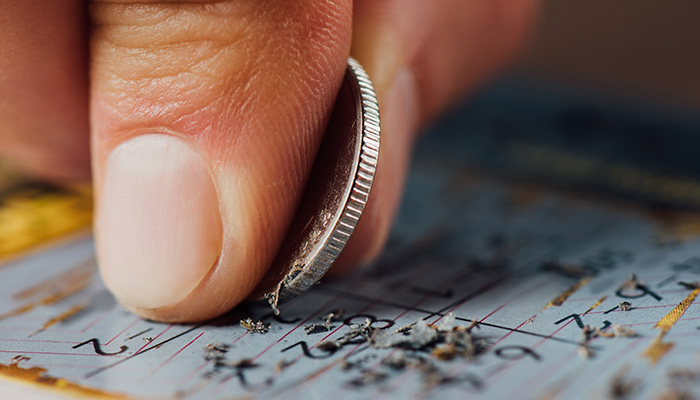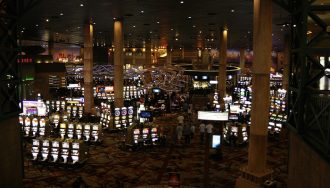History of Scratch Cards
 History of Scratch Cards
History of Scratch Cards
The history of scratch cards is as old as humans themselves — the simple yet thrilling concept of surprise. The shared anticipation as you scratch off a ticket, revealing hidden symbols beneath its shiny surface, is a feeling that transcends borders and is experienced by people from all corners of the world. This thrill has been marketed in many forms over the years, from lottery tickets to games of chance, but in the early 1970s, the first true scratch-off was born.
- Scratch Cards Throughout the Ages
- Scratch Cards
- Popular Scratch Ticket Games
- Online Casino Scratch Cards
- Conclusion
Scratch Cards Throughout the Ages
The evolution of scratch cards is a captivating journey. It all began in the 19th and early 20th centuries, but the concept of scratch cards did not take shape until the 1920s. Back then, at fairs and carnivals, you would receive a paper card with paint that you could scratch off. Matching the symbols would earn you additional prizes. These humble cards have since evolved, embracing new technologies and sophistication, culminating in the scratch cards we are familiar with today.
In the 19th century, companies promoted their products using pull tabs, a marketing tool in which a tab is pulled to reveal a hidden message or prize. These pull tabs were often attached to products such as bubble gum, packs of cigarettes, and beer. When pulled, they would reveal a symbol or a message that could be exchanged for a prize or a discount on the product.
The 70s marked a significant leap in the production and technology of scratch-off cards. The advent of digital scanning technology and computer-generated randomization revolutionized the industry, sparking a new era in the history of scratch cards. This technological leap made them more sophisticated and exciting than ever before, hinting at the endless possibilities for the future of gaming. It paved the way for more interactive and visually stunning games, virtual reality integration, and even more convenient ways to play. The future of gaming was being shaped right before our eyes.
In the early 2000s, scratch cards were a powerhouse, generating more than 50 billion in scratch ticket game sales. They accounted for more than 50 percent of the lottery sales in most cities, underscoring their significant role in the industry’s economic landscape. Many states, having once turned to lotteries as a source of funds, found it increasingly hard not to push forward with new games and more revenue. It quickly became not just a game but a significant contributor to the tax base.
In 1974, scientist John Koza and retail promotions specialist Daniel Bower, working for Scientific Games Corporation, produced the first computer-generated instant lottery game. Their collaboration and innovation led to the creation of the Instant Game scratch-off cards, which would change the scratch-off and lottery world forever. This marked the beginning of a new era of computer-generated, instant-win games, and their contributions proved crucial to remaking the entire face of lottery sales.
The two significant corporations producing scratch ticket games are Scientific Games Corporation and Pollard Banknote. In 1987, Astro-Med Inc. received the US Patent for instant scratch-off lottery tickets. However, the patent company acknowledges that the tickets had been available for many years before the patent existed.
Scratch Cards
Many cities offer second-chance sweepstakes with the purchase of state lottery tickets to help increase the demand for tickets and address the litter problems associated with discarded tickets. In doing this, the states can dispose of the lottery tickets and keep them from being improperly disposed of, thereby reducing the environmental impact of scratch cards.
Some scratch card manufacturers have started using recyclable materials. This initiative not only increases the demand for tickets but also contributes to the industry’s sustainability. Out of 44 states with a lottery, all but one offer second chance drawings. This has created a burgeoning industry of people who don’t buy tickets but simply collect others’ losing tickets from convenience store trash cans and along the street and submit them as their own.
Popular Scratch Ticket Games
Some popular adaptations of scratch ticket games include Major League Baseball, Monopoly, Marvel Comics, and card games such as poker or blackjack. Both the Mega Millions and Powerball have scratch-off versions of their very popular lottery games with huge jackpots.
Many states do very well with seasonal and holiday-themed scratch-off tickets, and the Wild Cherry and other slot machine-type symbols cards also do very well. We’d be remiss if we didn’t mention our favorite which is any gold mining-themed scratch-off.
The Set For Life scratch-off has become very popular in recent years. Instead of a large upfront jackpot, it pays out a monthly annuity for the life of the winner, or in some cases, just for thirty or forty years. This gives the winner peace of mind that they will always have money coming in and prevents those fears of huge lottery winners breaking in just a few years.
Online Casino Scratch Cards
The transition to online scratch-off games began in the late 1990s and early 2000s, coinciding with the rise of the Internet and online casinos. Early versions were quite basic, replicating the physical scratch card experience on a computer screen. However, as technology improved, so did the quality and variety of online scratch cards. Developers started incorporating vibrant graphics, colors, and engaging themes.
By the mid-2000s, online scratch cards had become a staple in the world of online gambling. The convenience of playing from home and the excitement of instant wins attracted a broad audience. Mobile technology further revolutionized the industry, allowing players to enjoy scratch cards on their smartphones and tablets. Today, online scratch cards continue to evolve, offering a diverse range of themes and innovative features that keep players coming back for more.
Online scratch cards are a digital adaptation of the traditional scratch-off lottery tickets that have been popular for decades. These virtual games offer the same instant gratification as their physical counterparts but with added convenience and variety. Players can choose from many themes ranging from adventurous treasure hunts to whimsical fairy tales, each with unique graphics and sound effects.
The gameplay is simple: just select a card of your choice, use your mouse or touchscreen to “scratch” off the surface, and watch as the symbols are revealed. With the potential for instant wins and the allure of big jackpots, online scratch cards provide a quick and entertaining escape, making them a favorite pastime for many, especially in states where online slots aren’t yet legal. Plus, integrating bonuses and promotional offers adds an extra layer of excitement.
Conclusion
Scratch cards have come a long way over the centuries, with technology definitely accelerating the pace of change over the past few decades. The evolution from simple paper cards to dynamic online experiences highlights the innate excitement for instant rewards and instant gratification.
Today, online scratch cards not only preserve the excitement of the original game but also offer endless possibilities for innovation and entertainment value. Whether you are a long-time fan or a curious newcomer, the world of online scratch cards promises an engaging and ever-evolving adventure that continues to captivate players around the globe. And with the advances of augmented reality and AI, the possibilities for the future scratch-off games are endless.




